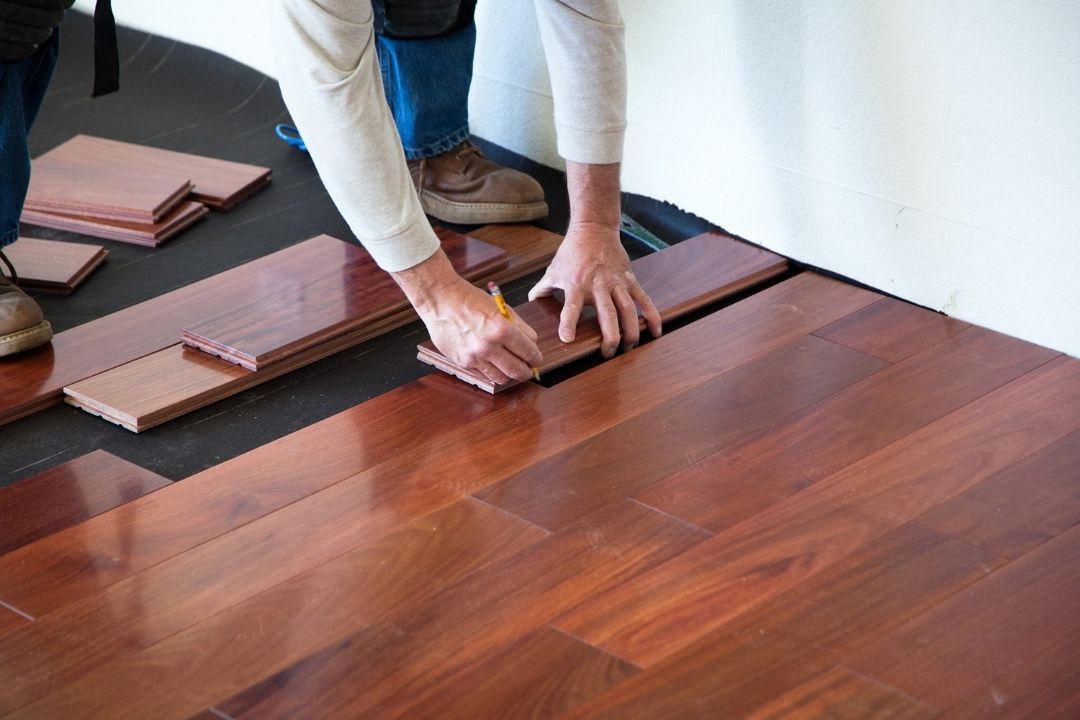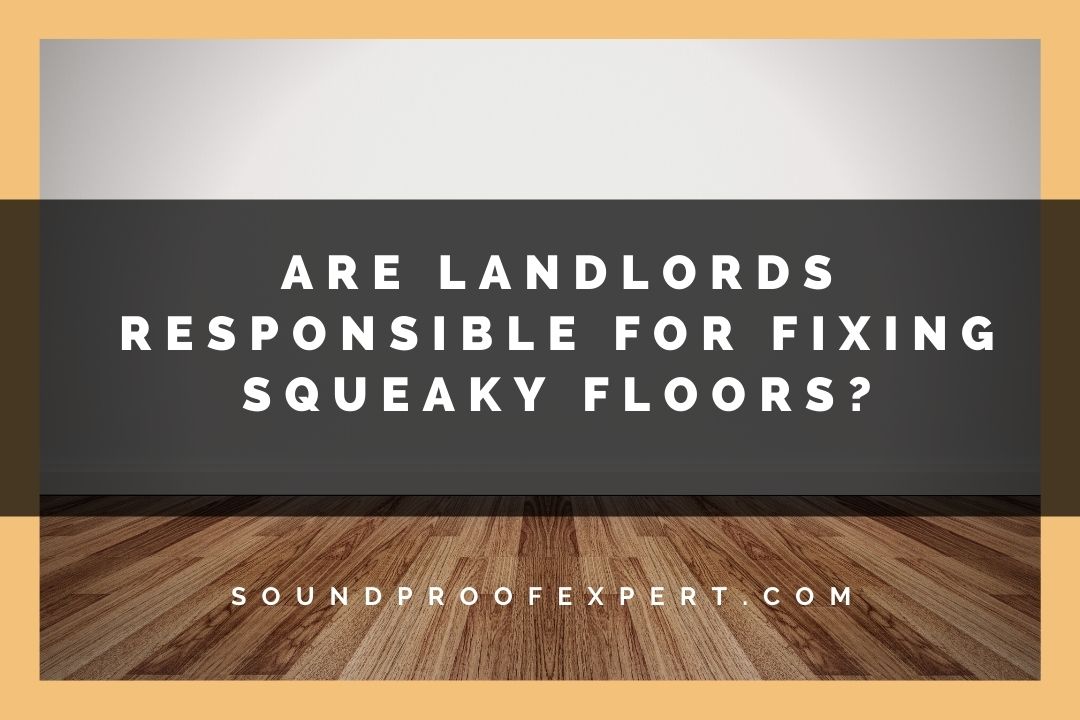Noisy and annoying, squeaky floors are a source of frustration for everyone.
When faced with this problem, you might find yourself wondering whether you can get your landlord to fix the issue.
But are landlords responsible for fixing squeaky floors in their rental properties?
Landlords are only responsible for fixing squeaky floors if it’s written in the lease. The law states that landlords must maintain the rental property in habitable condition. Since squeaky floors don’t make a property uninhabitable, that means a landlord isn’t responsible for fixing squeaky floors.
This article will give you more insight into this issue, including what the law says, your rights to repair as a tenant, and how you can ask your landlord to fix the squeaky floor.
Can You Ask Your Landlord To Fix Squeaky Floors?
You can ask your landlord to fix squeaky floors if your lease states that the landlord must bear the damages. By law, it’s not necessary for a landlord to fix squeaky floors because squeaky floors don’t make the property uninhabitable.
Now, let’s explore what the law says about the issue.
Landlords Must Ensure Their Properties Are Habitable
The rules regarding rental properties may vary from one state to another. But one thing is for sure; landlords are responsible for maintaining the rental property in habitable condition.
A habitable condition means the rental property must be livable and safe enough to provide comfort for the people residing inside.
So, what does this mean?
This regulation is up for interpretation in some states, giving no specific requirements on what a landlord must provide. Meanwhile, some state laws lay out some specific conditions for the rental property to be considered habitable.
Generally, landlords are responsible for providing essential items or services to keep the property habitable. Essential items and services are things that directly affect the safety, security, and sanitation of the property, such as:
- Well-maintained basic structural elements of the building, including floors, walls, stairs, and roofs
- Effective weather protection on the roofs and exterior walls
- Adequate heating and air-conditioning systems
- Electrical outlets, wiring, and lighting
- Proper ventilation and plumbing systems
- A water supply that can provide running hot and cold water
- Good sanitary and garbage removal systems
- Law-conforming locks and deadbolts on the front and back door
If landlords refuse to provide habitable housing that meets the minimum requirements above, some state laws allow tenants to:
- Pay for the repairs and deduct the cost from their rent.
- Withhold rent payment until an agreement has been reached.
- Move out without notice.
- Sue the landlord.
Any problem that doesn’t directly affect the property’s habitability is considered non-essential. Legally, your landlord doesn’t have an obligation to fix non-essential issues unless stated otherwise in the lease.
Are Squeaky Floors Essential or Non-Essential Issues?

Squeaky floors are considered a non-essential issue, unfortunately. As long as the floor is still intact and safe to use, the property’s squeaky floors aren’t considered a habitability issue. You’ll have to fix your floors yourself as a tenant if the squeaky floor noises bother you.
Minor damages or problems, which don’t affect the property’s health, safety, and sanitation, don’t make the property uninhabitable and thus, not covered by the law.
Are Landlords Responsible for Non-Essential or Minor Issues?
Landlords are not responsible for fixing non-essential and minor issues legally. However, tenants must always check the terms written on their leases. That’s because the terms of their leases might give them the right to demand small repairs from their landlords.
Additionally, you can find the solution to your problem by looking at:
- Any written or oral promises made by your landlord to solve the problem
- Local building codes
- State Landlord-Tenant laws
You May Ask Your Landlord To Make Minor Repairs
If you’ve found evidence in your lease or the local building codes that your landlord is legally responsible for fixing your squeaky floors, you can contact your landlord and demand your rights.
However, you must realize that it’ll be harder to enforce your rights for non-essential or minor repairs, such as fixing your squeaky floors.
For fixing, avoid withholding your rent or deducting the cost of fixing your floors from your rent payment. Taking these actions for non-essential problems might result in you getting evicted or sued.
Here are some things you could do to ask your landlord to fix your squeaky floors.
Write a Request for Repair
Chances are, you’ve already brought this problem up to your landlord. That said, the Landlord-Tenant laws in most states say that a landlord doesn’t need to start the repairs until they receive a written request from their tenant.
So, writing a formal repair request might be helpful, even if you’ve verbally brought the issue up before.
Try to cite parts of your lease stating your rights to repair in the request letter. Also, include documentation photos if the problem is visible. For example, if you notice certain parts of the floor are causing it to sound squeaky.
Additionally, send the request letter with a witness present, and if possible, have the landlord sign and date the letter to prove that they’ve received it. Lastly, don’t forget to keep a copy of the letter for yourself.
Report to Your Local Housing Agency
If your landlord has done nothing despite receiving the request letter for more than 30 days, try reporting them to the local building or housing agency.
Check the local housing codes and see if your squeaky floors violate any of those codes. If so, call the agency to take action instead of your landlord.
File a Small Claims Case
Lastly, you may try filing a small claims case. If you can prove your rights to repair and the unaddressed issues regarding your rental property, a judge may help solve your problem.
Don’t forget to submit your lease and clear documentation of the damage, along with your landlord’s refusal to comply with your request to help your case.
Note that you should only be doing this as a final resort. Suing your landlord will turn your landlord-tenant relationship south. Besides, taking this to court might be costly and time-consuming.
Final Thoughts
In most cases, landlords aren’t responsible for fixing squeaky floors since they’re considered non-essential, which doesn’t make the property uninhabitable.
However, always check your lease anytime a minor or non-essential problem arises. Sometimes, the issue might actually be covered on the lease. When that’s the case, you have the right to demand reparation from your landlord. You can even sue them for breaching the lease if they refuse to fix the problem.
Sources
- Tenants Union: Steps to Request a Repair
- Turbotenant: How long does a landlord have to fix something?
- Nolo: Renters’ Rights to Minor Repairs
- Nolo: Tenant Rights to a Livable Place
- Civil Law Self-Help Center: Habitability And Essential Services
- Lawyers.com: Why Landlords Must Provide Livable Rentals
- NRS: Landlord and Tenant Dwellings


I own my condo. Built in 1980. I am on the lower level. I feel certain that the materials used in 1980 were reasonable way back when. Flash forward to 2022 – there’s virtually nothing left in the ceiling to dampen – much less irradicate – the foot traffic.
I’m looking for a solution that will remove the noise entirely, or get very close to zero noise. A friend suggested that I look for an expert company that’s able to fill the areas with firm foam. A seasoned professional should be able to estimate where the boards criss-cross, then fill it with dense foam.
I’d LOVE suggestions and referrals to EXPERTS that can relieve the angst I suffer with every single day.